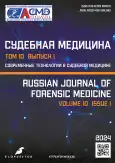Use of chipping technology and DNA identification in identifying a minor: a review
- Authors: Doszhanova A.B.1, Begaliyev Y.N.1, Kurmangali Z.K.2, Imashev B.M.3
-
Affiliations:
- Academy of Law Enforcement Agencies Under the General Prosecutors Office of the Republic of Kazakhstan
- Department of Internal Medicine of the Corporate Fund University Medical Center
- Eurasian Center for Economic and Legal Studies of Narxoz University
- Issue: Vol 10, No 1 (2024)
- Pages: 79-87
- Section: Reviews
- URL: https://bakhtiniada.ru/2411-8729/article/view/254429
- DOI: https://doi.org/10.17816/fm16095
- ID: 254429
Cite item
Full Text
Abstract
This study examines the possibility of using juvenile offender identification technologies such as chipping and DNA identification. Chipping requires finding a balance between security and respect for the child’s privacy. The use of newer genetic technologies is promising. The creation of a DNA database contributes to the improvement of law enforcement agencies, especially by increasing the possibility of criminal identification. However, the collection of genetic material from minors is challenging for several reasons, which requires ways to overcome them.
To study the problems and prospects of the use of information and communication technologies in the identification of juvenile offenders in Kazakhstan, a comparative legal analysis is used, which allows to identify the possibility of using chipping and genomic identification. Currently, the Kazakhstani society rejects the possibility of chipping people, much less children. Therefore, it is crucial to consider all aspects and carefully analyze possible consequences before deciding on this technology.
Presently, the activity of law enforcement agencies of the republic is unthinkable without the use of information technologies. To improve this process, new modern systems of personal identification and a database of biometric parameters should be developed. The main obstacle of chipping in minors in any of its variants (implanting a chip under the skin or sewing it into school uniforms) is legislative regulation and ethical barriers, whereas the unique biometric technology — DNA identification — has several advantages in establishing the identity of citizens, including minors. In this regard, there is a need for a unified legislative regulation of state biometric registration.
The comparative analysis of technologies showed that DNA identification is a more promising and regulated procedure at this stage. Thus, possible directions for the use of this method in the course of establishing the identity of a minor are described.
Full Text
##article.viewOnOriginalSite##About the authors
Aitolkyn B. Doszhanova
Academy of Law Enforcement Agencies Under the General Prosecutors Office of the Republic of Kazakhstan
Author for correspondence.
Email: aitok82@mail.ru
ORCID iD: 0009-0007-3257-6601
Kazakhstan, Koshy
Yernar N. Begaliyev
Academy of Law Enforcement Agencies Under the General Prosecutors Office of the Republic of Kazakhstan
Email: ernar-begaliev@mail.ru
ORCID iD: 0000-0001-6659-8576
SPIN-code: 4397-7648
Dr. Sci. (Legal), Professor
Kazakhstan, KoshyZhanar K. Kurmangali
Department of Internal Medicine of the Corporate Fund University Medical Center
Email: zhanar.k.kurmangali@gmail.com
ORCID iD: 0000-0001-9380-3432
SPIN-code: 7987-3742
MD, Dr. Sci. (Med.)
Kazakhstan, AstanaBerik M. Imashev
Eurasian Center for Economic and Legal Studies of Narxoz University
Email: berikmazhitovich@gmail.com
ORCID iD: 0009-0001-8760-9913
SPIN-code: 4888-0942
Cand. Sci. (Legal)
Kazakhstan, AlmatyReferences
- Weber K. Privacy invasions: New technology that can identify anyone anywhere challenges how we balance individuals' privacy against public goals. EMBO Rep. 2006;7(S1):36-39. doi: 10.1038/sj.embor.7400684
- Alikperov HD. Global remote crime control: acceptability, opportunities, costs. Criminology: yesterday, today, tomorrow. 2016;(3):26-33. (In Russ). EDN: WWRTDB
- Wang Y. A review of microchip implant in human. In book: Proceedings of the 2022 6th International Seminar on Education, Management and Social Sciences (ISEMSS 2022). 2022. P. 92-97. doi: 10.2991/978-2-494069-31-2_12
- Tursunov AB, Galitsky FA, Begaliev EN, et al. Forensic and forensic aspects of childhood traumatism as a result of domestic injuries and traffic accidents: A review. Russ J Forensic Med. 2023;9(3):299-308. EDN: ORUBFH doi: 10.17816/fm12389
- Voyevodkin DV, Rustemova GR, Begaliyev YN, et al. Identifying fake conclusions of forensic medical examinations using an artificial intelligence technology based on the experience in the Republic of Kazakhstan: A review. Russ J Forensic Med. 2023;9(3):287-298. EDN: EFNJIE doi: 10.17816/fm8270
- Orakbayev AB, Kurmangali ZhK, Begaliyev YeN, et al. ON The issue of using the results of a virtual autopsy in criminal investigation: A review. Russ J Forensic Med. 2023;9(2):183-192. EDN: OEERGD doi: 10.17816/fm774
- Kurskaya SA. Obligatory state genome registration in contradiction with the constitutional right to privacy. State power and local self-government. 2023;(7):3-6. EDN: DFZJYH doi: 10.18572/1813-1247-2023-7-3-6
- Zhoga EYu, Vasenin AYu, Varchenko IA. The role of state genomic registration in the prevention, detection and investigation of crime. Humanities, social-economic and social sciences. 2017;(6-7):117-121. (In Russ). EDN: ZEGEWX
- Mashkov SA, Ogorodnikova AV. On the meaning of a dna analysis and genome registration. Ekspert-kriminalist. 2021;(1):26-28. EDN: OLAXSZ doi: 10.18572/2072-442X-2021-1-26-28
Supplementary files








